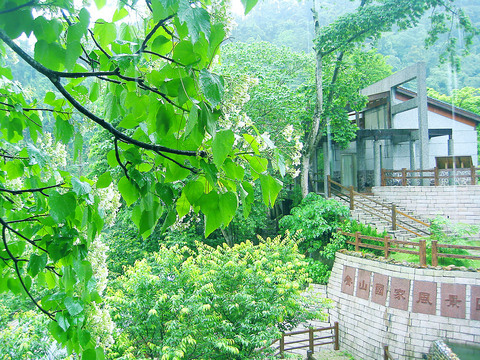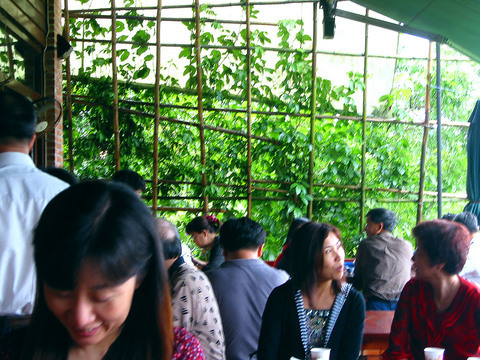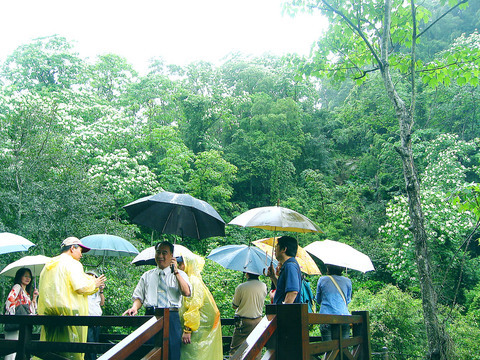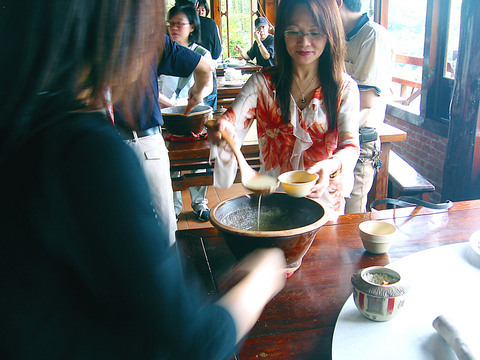You only have to wander around the alleys of any Taipei residential district to know that despite the city's reputation for being a chaotic urban jungle, flowers are an important part many people's lives: Citizens grow flowers on rooftops and from tiny balconies among tightly packed apartments; they crowd the city's flower markets each weekend; and they go off in vast numbers to view peonies, lilies, and cherry blossoms during seasonal festivals of floral appreciation.
A recent addition to the calendar of floral appreciation is the Tung Blossom Hakka Festival (
This festival, which started three years ago, is unabashedly a product of cultural marketing, but it must be said that this in no way reflects on the actual appeal of the tung blossoms, which in full bloom, present a lovely sight.

PHOTOS: IAN BARTHOLOMEW, TAIPEI TIMES
The fact that the Hakka Affairs Commission has chosen to link the flower with Hakka culture may have little basis in tradition, but the fact that they have put their weight behind promoting routes along which the tung blossom can be admired can only benefit locals and tourists. It is also an opportunity to showcase many unique aspects of Hakka culture, especially its cuisine. After all, eating is one of the central aspects of tourism in Taiwan.
The Lion's Head Mountain Visitors' Center (
According to a visitor's center staffer, the tung blossom, a simple flower with a light, almost imperceptible fragrance, compared to the frugality and simplicity of the Hakka people. This is probably news to many Hakka in Taiwan, though it is an undeniable fact that the tung tree can be found in many hilly areas where Hakka are also numerous.

But the idea that the tung flower is somehow representative of the Hakka is a bit of marketing license that nobody seems to mind too much -- especially if you are sitting on the teahouse balcony sipping on fragrant white oolong and nibbling on mochi, a gluttonous rice cake that is most often served with ground peanuts.
In fact, putting aside the whole issue of whether tung flowers are related to Hakka culture or not, the story of why the tree was introduced to Taiwan proved most diverting. And it may even be true. According to the ever-helpful staffer, the introduction of the Tung tree was something of a mistake. During the 1970s, there was a huge demand for the hard wood of the Chinese phoenix tree (Firmiana simplex), which is called wu-tung in Mandarin.
The Chinese phoenix tree produces a wood of exceptional hardness, much valued in furniture-making, but its supply was limited by its slow growth. Wanting to make the most of the high prices, local farmers began to harvest the fast-growing tung trees (Aluerites montana), selling the timber off as that of the wu-tung. Swathes of tung had been planted before the fraud was discovered, but when that happened, the market for both tung and wu-tung collapsed.

What remains are the forests of tung and the lovely flowers they produce in May, which are now, in their turn, being exploited as a tourism resource. Having created carpets of white flowers along the walking train at Lion's Head Mountain that float gently down the stream beneath the teahouse, it has to be admitted, that -- whatever their origin as an ultimately unsuccessful fraud -- as a backdrop to a day idling away in the hills of Hsinchu, the "happy accident" of their presence can only be applauded.
After the flowers came the food. Tourism in Taiwan is dominated by the need to sample local specialties, and fortunately Hakka cuisine offers a rich and diverse menu. For this aspect of the visit, we visited the Gengye Yuemei (
But no dish has been so intimately connected to the Hakka as leicha (

"We are manufacturing our culture," said one person good humoredly. According to an International Center for Hakka Studies of the National Chiao-Tung University (
Whatever the truth of historical Hakka links with the tung flower and leicha, these explanations are now being created or at least reinforced. It has given the area around Lion's Head Mountain, and other Hakka communities where ecotourism meets cultural awakening, a thematic cohesion that is quite appealing.
So, as you drink your tea and gaze lazily across expanses of leaves and flowers, you can ponder the subtleties of cultural development and the improbable events that can influence it. The flowers certainly do not look any the less attractive for having a stomach full of good Hakka food and a couple of glasses of leicha.
Festival Information:
What: Tung Blossom Hakka Festival (客家桐花祭)
When: Until May 16
Location: The Lion's Head Mountain Visitors' Center
Tel: (03) 580 9296
Hours: Open between 8am and 5:30pm.
Gengye Yuemei
Where: 5, Lin 7, Cisin Village, Ermei Township, Sinchu County (新竹縣峨眉鄉七星村7鄰5 號)
Tel: (03) 580 9666

On April 26, The Lancet published a letter from two doctors at Taichung-based China Medical University Hospital (CMUH) warning that “Taiwan’s Health Care System is on the Brink of Collapse.” The authors said that “Years of policy inaction and mismanagement of resources have led to the National Health Insurance system operating under unsustainable conditions.” The pushback was immediate. Errors in the paper were quickly identified and publicized, to discredit the authors (the hospital apologized). CNA reported that CMUH said the letter described Taiwan in 2021 as having 62 nurses per 10,000 people, when the correct number was 78 nurses per 10,000

As we live longer, our risk of cognitive impairment is increasing. How can we delay the onset of symptoms? Do we have to give up every indulgence or can small changes make a difference? We asked neurologists for tips on how to keep our brains healthy for life. TAKE CARE OF YOUR HEALTH “All of the sensible things that apply to bodily health apply to brain health,” says Suzanne O’Sullivan, a consultant in neurology at the National Hospital for Neurology and Neurosurgery in London, and the author of The Age of Diagnosis. “When you’re 20, you can get away with absolute

May 5 to May 11 What started out as friction between Taiwanese students at Taichung First High School and a Japanese head cook escalated dramatically over the first two weeks of May 1927. It began on April 30 when the cook’s wife knew that lotus starch used in that night’s dinner had rat feces in it, but failed to inform staff until the meal was already prepared. The students believed that her silence was intentional, and filed a complaint. The school’s Japanese administrators sided with the cook’s family, dismissing the students as troublemakers and clamping down on their freedoms — with

As Donald Trump’s executive order in March led to the shuttering of Voice of America (VOA) — the global broadcaster whose roots date back to the fight against Nazi propaganda — he quickly attracted support from figures not used to aligning themselves with any US administration. Trump had ordered the US Agency for Global Media, the federal agency that funds VOA and other groups promoting independent journalism overseas, to be “eliminated to the maximum extent consistent with applicable law.” The decision suddenly halted programming in 49 languages to more than 425 million people. In Moscow, Margarita Simonyan, the hardline editor-in-chief of the